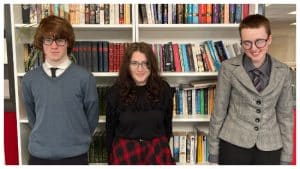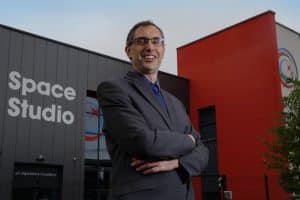Being able to make an appointment with a doctor is not easy at the best of times. During the Covid-19 pandemic this became near-impossible. Finding a solution to enable patients to receive better treatment was the challenge that was recently set for Year 12 students at Space Studio West London.
Split into 11 groups they were tasked with finding solutions for three different types of diseases:
- Chronic Obstructive Pulmonary Disease (COPD, term used for lung conditions that cause breathing difficulties)
- Lung cancer
- Depression and anxiety
The project was an example of real-world learning and part of the Aspirations Employability Diploma (AED) which is unique to all schools that are part of the Aspirations Academies Trust including Space Studio West London. Places are currently available for Year 10 & Year 12 students for the academic year beginning September 2022. To find out more or to apply for a place go to: www.spacestudiowestlondon.org or email: office@spacestudiowestlondon.org.

Year 12 students Aspen Hatton, Ellie Phillips and Aiden Tomlins were crowned the winners of the AED project.
The aim of the diploma is to equip students with the attributes needed to thrive in the workplace. Creativity, teamwork, problem-solving and communication are key skills they acquire during their real-world projects.
Once each group had selected a health problem to tackle, they spent months researching their idea before putting together a presentation in a Dragon’s Den style session to outline their solution.
The health problems the students were asked to look at were challenging: COPD is normally diagnosed through breathing tests in front of a doctor, an X-ray and blood tests. One of the key means of tackling depression and anxiety is through talking therapies.
Stephanie Lee, Careers Lead at Space Studio West London which is located in Letchworth Avenue, Feltham, told The Hounslow Herald: “The aim of the project was to mirror the real working world. The students tackled the project from various angles and many encountered obstacles along the way. It was not so much about solving the problem, but how they dealt with it. The students had to liaise with their mentors and had deadlines to meet. We brought the working world into the classroom.”
Year 12 students Aspen Hatton, Ellie Phillips and Aiden Tomlins were crowned the winners of the AED project. They looked at COPD and came up with the idea for an Electro galvanic sensor linked to an Amazon Alexa device to help manage and monitor the health condition. It is technology that is already used in ventilators and scuba equipment.

Andy Morgan, Principal of SSWL
Chris Morgan, a Principal at company ZS, and his colleagues were one of a number who judged the presentations before selecting a winning group and runners up.
ZS works with companies around the world in industries ranging from healthcare to high-tech to financial services and beyond. ZS helps clients with strategy, analytics and technology.
Mr Morgan said: “These were challenging diseases to look at and the answers to tackling the problem ranged from digital to traditional.
“Everyone did an impressive job of researching these different disease areas.
“It was quite powerful seeing 17-year-olds presenting articulately about depression and anxiety and the empathy they had developed as a result of their research.
“It was also impressive to see them get up and present and to be so willing to do it in front of strangers.
“There were a number of different solutions with a lot of groups having ideas that were a way of allowing people to get diagnosed and get information to doctors.
“The team that won, the thing which tipped it in their favour and the runners up was that they thought about it from a patient’s perspective and they weren’t just thinking about the disease.
“Another team came up with a way for people to carry out a form of self-diagnosis – should they really be seeking advice from a doctor?”
Providing his thoughts on the benefits of the AED, Mr Morgan said: “I think the AED is a great way to learn about the world and to explore topics and to develop valuable skills like presenting confidently.
“It was a really great afternoon. Our firm [ZS] is full of Type A high achievers where everyone either has a degree from Oxbridge, a PhD or a medical qualification – so a demanding audience. Everyone who participated said how much they enjoyed it and they were impressed with the level of research done.”

